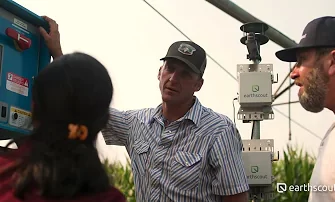Bert Bouwman has been farming for over 35 years. He grew up farming in Brazil, moved to the Netherlands and now farms in Minnesota. An entrepreneur at heart, Bert and his family operate Twin Cities Corn Maze. A fall festival that draws thousands of people each year.
They also grow a dozen different high value crops, including sweet corn, watermelons, cantaloupe, pumpkins, cucumbers and strawberries, and sell them through local produce stands and major supermarkets. Two years ago, Bert and his son, Birand, purchased one EarthScout to help them save money on pivot and drip irrigation.
Research shows many growers tend to overwater their crops as a precaution. EarthScouts Grow Coach has worked with Bert to reduce his irrigation to the minimum moisture for healthy growth just above the wilting point. Since then, they’ve saved over 50% on water and irrigation costs, and last season they purchased three more EarthScouts for their greenhouse, watermelon field and strawberry field. In addition to big savings on irrigation, Bert has learned how to use EarthScout to dial in his drip irrigation system for growing the sweetest, juiciest watermelons. With watermelons and this type of soil, I try to stay about 12% moisture, so I will start irrigation, go up to 16% and let it come down to the 12%. And that’s the sweet spot that I have for a while now. Under irrigation, we could have this what’s called hollow heart, and that will be another marketable fruit, not very desirable and over irrigating. I will increase the cost of irrigating, plus I will have more dilutive flavor will be a very juicy watermelon, but the flavor is not going to be there. Bert has applied his knowledge to his strawberries as well. The soil in the strawberries is a little bit different and I have. So I look for a 16% moisture. Bert can know the bricks of his berries by taste, so he was able to quickly dial in the ideal moisture level for the sweeter strawberries.
With the strawberries, what we do is we want to keep the water level low so we can have the sweetness, the BRICS content, to be higher. So Bert is using that data almost on an hourly basis through the day to actually make irrigation decisions and nutrient decisions on his farm.
His melons to his strawberries. He’s optimizing them so that they are the peak of flavor and freshness when it comes to selling the fresh markets. The Bouwman’s are also using EarthScout in the greenhouse. We got a total of three rows in here, trellis all up just makes it a lot easier for us to pick. Disease controls a lot easier in a greenhouse. You’re not getting the moisture from the outside and we love the EarthScout. We’re using it to monitor not only the solar radiation, but as well the air temperature, which is a huge deal in here because in a matter of a second, the temperature can go up 20 degrees. It’s fantastic for not only irrigation, but fertigation as well because we’re able to see the conductivity of the soil. That lets us know when we have to put certain nutrients into the ground, how to monitor and keep that consistent, as well as just moisture.
We can see the soil moisture content when we need to pull water. The deviation in the amount of water, which is really important, especially with these cucumbers. We love the EarthScout because we can have alerts set up on that. And as soon as that temperature starts raising, we get a notification on our phone, we’re out here lifting up the sides of the greenhouse. EarthScout not only saves money in time, but also provides peace of mind. The EarthScout gives me peace of mind because I do like to know what’s going on even when I cannot physically be in the field. I know what’s happening. So if you were to meet a farmer that had never heard about EarthScout before, why would you tell them to use EarthScout? I won’t tell him, because he is my competitor (jokingly).
But a farmer who is willing to improve on his quality is a tool that he needs to have. Yeah, so what Bert’s doing at Twin Cities Maze, from one farmer to another is incredible. To watch him on a daily basis, use the EarthScout units to help manage his water in a more sustainable way to help optimize his ROI when he’s selling fresh fruit stands across the Twin Cities. I mean, a lot of people would say that Bert’s a small farmer while he’s farming in a really big way with EarthScout.



